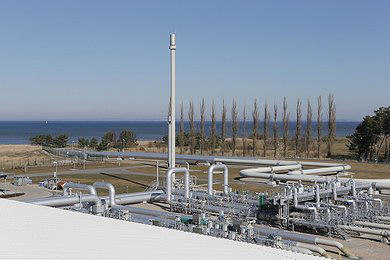|

BASF and Gazprom sign Memorandum of Understanding
to expand Nord Stream
pipeline
BASF intends to participate in planned Nord Stream pipelines 3 and 4
through the Baltic Sea ...
Supply security for natural gas
in Europe to be strengthened
July 31, 2015 + + + BASF subsidiary Wintershall intends to
participate in expanding the capacities of the Nord Stream pipeline, which
delivers Russian natural gas to European customers via the Baltic Sea. A
Memorandum of Understanding to this effect was signed today. This
expansion of the Nord Stream pipeline will consist of two additional
pipelines that could transport up to 55 billion additional cubic meters of
Russian natural gas directly to Germany.
“Together with our
partners, we successfully created the Nord Stream gas transportation
corridor, which is unparalleled in the world. In view of the rising demand
for gas across the whole of Europe, the expansion of the gas
transportation infrastructure, which provides a direct link from the
Russian gas deposits to the European markets, will help to further improve
the security of the gas supply for the European continent,” stated
Alexander Medvedev, Deputy Chairman of the Management Committee of PJSC
Gazprom.
“BASF and Gazprom have been cooperating for more than 20
years on the construction of pipelines to ensure secure supplies of
Russian gas to Europe. We want to bring our expertise in this field to the
expansion of Nord Stream and look forward to working with Gazprom and
further European partners on this important infrastructure project,” said
Hans-Ulrich Engel, member of the Board of Executive Directors of BASF SE.
In addition to Gazprom,
E.ON,
OMV and
Shell have declared their
intention to participate in the construction of the two additional lines
of the Nord Stream pipeline.
The first two lines of Nord Stream,
in which the BASF subsidiary Wintershall has a 15.5% stake, have been
operational since October 2012. The Russian natural gas arrives at the
mainland in Lubmin/Germany on the Baltic Sea coast and is transported from
there via the two connecting pipelines OPAL
(Ostsee-Pipeline-Anbindungs-Leitung – Baltic Sea Pipeline Link) and NEL
(Nordeuropäische Erdgasleitung – North European Gas Pipeline) to customers
in West and Central Europe.
The existing pipelines already make a
vital contribution to strengthening supply security and meeting long-term
demand for natural gas import in Germany and Europe. The EU’s import
requirements are expected to rise further, since the gap between the
production and consumption of natural gas continues to grow. The IEA
forecasts that European gas production will fall by about 2% a year, while
consumption will rise by 0.6% per year.
Source: Dr. Stefanie
Wettberg, BASF SE, www.basf.com
Michael
Sasse, Wintershall Holding GmbH,
www.wintershall.com
|

Worldwide more than
100,000 paid subscriptions
| Since May 2015 OG&PE (Oil, Gas &
Petrochem Equipment) is published as part of the OIL & GAS
JOURNAL to serve a consolidated monthly audience of 135,000 oil
and gas professionals worldwide -
read more |

Worldwide
more than 48,000 subscriptions -
100% one-year direct request
qualification

'What's New' in Upstream, Midstream and
Downstream Products & Services. Circulation 37,000
PennWell
Petroleum Group:
Oil & Gas Journal
Oil & Gas Journal Russia
OGJ_eNewsletter
OGJ-Website-Statistics
Oil, Gas & Petrochem Equipment
Offshore Magazine
Offshore
Russia
Offshore eNewsletter
Offshore
Website Statistics
Oil & Gas Financial Journal
+ + +
For more information, media
kits or
sample copies please contact
Andreas
Sicking
+49 (0)2903-338570
wilhelms@pennwell.com
www.sicking.de
|



